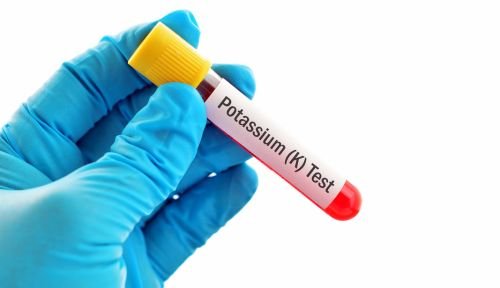Potassium is an essential mineral for our body, which we need to regulate the function of the heart and muscles, maintain the normal functioning of the nervous system and regulate the body's fluid balance. Excess potassium can cause serious health problems, so it's important to know how much potassium we have and how to regulate it.1
A lack of potassium can cause muscle weakness, fatigue, and an irregular heartbeat. However, too much potassium in the body can cause serious health problems, such as arrhythmia, which is a dangerous medical condition characterized by an irregular heart rhythm.
Excess potassium, medically known as hyperkalemia, is a condition in which the level of potassium in the blood is too high. This often happens when the kidneys are unable to filter potassium properly. Hyperkalemia can cause serious health problems if not properly diagnosed and treated.
Interesting facts about potassium
Potassium is the third most abundant mineral in the body and makes up about 2% of our body mass.
Potassium is also key electrolyte, which helps regulate the body's fluid balance.
Potassium is also an important component of the nervous system. It helps transmit nerve impulses that control our muscles, heart and other organs. In addition, potassium helps regulate our body's pH balance, thus ensuring optimal functioning of our organs.
Although potassium is essential for our bodies, too much of it can be dangerous.

Dangers of Too Much Potassium
Excess potassium in the blood can cause hyperkalemia, a condition characterized by too much potassium in the blood. Hyperkalemia can cause serious symptoms such as heart rhythm problems, muscle weakness, or even paralysis. The dangerous limit is when the concentration of potassium in the blood exceeds 5.3 mmol/l. This can lead to serious health problems, including heart problems and muscle weakness. It is important to draw attention to others as well blood test results.
Too much potassium can also cause kidney problems. This is because the kidneys are responsible for excreting potassium from the body. If potassium levels are too high, the kidneys may no longer be able to excrete potassium properly, which can lead to serious health problems.
In addition, too much potassium can cause problems with the nervous system, such as numbness or problems with coordination of movements. This can cause difficulty in performing daily tasks and can have serious consequences for your quality of life.
Who is more likely to have hyperkalemia?
Hyperkalemia usually occurs in patients with kidney failure or those taking medications that retain potassium in the body. Men are more susceptible to this condition than women.
Hyperkalemia risk groups
Newborns are particularly at risk for this condition, as their kidney function is not yet fully mature, and people over 60 years old, who often take medication and may have impaired kidney function.
Signs and symptoms of too much potassium
The signs and symptoms of too much potassium can vary widely and depend on how much potassium you have in your blood. Some people may experience heart rhythm problems, muscle weakness, numbness or problems with coordination of movements.
When potassium levels are very high, you can experience cardiac arrhythmia, a serious abnormal heart rhythm. This condition can cause palpitations, chest pain, shortness of breath, weakness or even loss of consciousness.
Kidney problems can also be a sign of too much potassium. If your kidneys can't excrete potassium properly, you may experience kidney problems such as decreased urine output, edema, high blood pressure, or even kidney failure.

What causes too much potassium?
Too much potassium can be caused by many reasons. One of the main causes is kidney problems, as the kidneys are responsible for excreting potassium from the body. Kidney failure, kidney disease, or the use of certain medications that affect the kidneys can cause too much potassium.
Some foods can also be high in potassium. If you eat a lot of foods that are high in potassium, it can cause you to have too much potassium. For example, bananas, tomatoes, avocados, spinach and other vegetables and fruits can be high in potassium.
Also, some diseases, such as diabetes, can cause excess potassium. This is because these diseases can disrupt the excretion of potassium from the body.
Causes of hyperkalemia
There are three main mechanisms of hyperkalemia:
- Excessive potassium intake. This problem can only arise if there is a nearby disorder of potassium excretion through the kidneys.
- Impaired excretion of potassium through the kidneys. This is the most common cause of hyperkalemia.
- Intracellular potassium migration into the extracellular fluid. This can occur with increased blood osmolarity, muscle wasting, or tumors.
What to eat when there is too much potassium
When you have too much potassium in your blood, it's important to adjust your diet to reduce potassium levels. There are some foods you can eat to lower your potassium levels.
First, eat foods that are low in potassium. This includes vegetables and fruits such as apples, pears, carrots, blueberries, grapes and others. You can also eat low-potassium grains such as rice, wheat, and oats.
Second, avoid foods that are high in potassium. This includes vegetables and fruits such as bananas, tomatoes, avocados, spinach and others. Also, avoid eating too much red meat, as it can also be high in potassium.
Finally, drink enough water. Water helps flush excess potassium from the body, so it's important to drink enough water every day.

Foods to avoid when potassium levels are too high
When you have excess potassium, it is important to avoid foods high in potassium. This includes many vegetables and fruits such as bananas, tomatoes, avocados, spinach and others.
Red meat should also be avoided as it can also be high in potassium. Instead, you can eat proteins with less potassium, such as chicken, beef or fish.
Also, avoid foods that are high in salt. Salt can increase the amount of potassium in the body, so it is important to reduce salt consumption.
Tips for managing too much potassium
If you are diagnosed with too much potassium, it is important to take steps to regulate it. Here are some tips on how to do it.
First, regulate your diet. Eat foods that are low in potassium and avoid foods that are high in potassium. Also, drink enough water to flush excess potassium from your body.
Second, monitor your health. Go for regular checkups to keep track of your potassium levels. If you notice any symptoms, such as heart rhythm problems, muscle weakness, or problems with coordination, see your doctor right away.
Finally, if you are prescribed medication that can increase your potassium levels, talk to your doctor about alternatives. Some medications, such as certain diuretics, can increase the amount of potassium in the body.
Medical interventions for excess potassium
If your potassium level is too high and you need medical intervention, there are several possible treatments. First, your doctor may suggest changing your diet to lower your potassium levels.
In addition, your doctor may suggest medications that help the body excrete excess potassium. These can be diuretics, which increase the amount of urine and help remove potassium from the body.
Finally, if your potassium levels are very high, your doctor may suggest hemodialysis. This is a procedure in which the blood is filtered through a machine to remove excess potassium.
Questions are often asked about too much potassium
What is a normal potassium level?
Normal blood potassium levels are between 3.6 and 5.2 millimoles per liter. If your potassium level is higher, it may mean that you have too much potassium in your body.
Can too much potassium cause heart rhythm problems?
Yes, too much potassium can cause heart rhythm problems such as arrhythmia. This is because potassium regulates the activity of our heart.
Are there medications that can increase potassium levels?
Yes, there are some medications that can increase potassium levels. These include certain diuretics, potassium supplements, and certain high blood pressure medications
Can excess potassium be avoided?
Excess potassium is often associated with other health problems, so it's important to get regular health checks and follow your doctor's recommendations. It's also important to take your medications as directed by your doctor and eat a healthy diet.
How is excess potassium treated?
Treatment for excess potassium depends on its cause and severity. Dietary changes, medication adjustments, special medications that help lower blood potassium levels, or, in severe cases, dialysis may be recommended.
What causes excess potassium?
There are several reasons why excess potassium can occur. This can be related to certain medications, kidney problems, consuming too much potassium through food or supplements, or certain medical conditions such as Addison's disease.
Conclusion: A healthy lifestyle and balanced potassium intake
Too much potassium can cause serious health problems, so it's important to monitor your potassium levels and adjust your diet. Eat foods that are low in potassium and avoid foods that are high in potassium.
Also, visit your doctor regularly to monitor your potassium levels and make lifestyle changes as needed.
Remember, a healthy diet and balanced potassium intake are the keys to a healthy life.












2 comments
Stas
What to do if blood tests for potassium, vitamin B12 and vitamin D are too high.
Andrew
Elevated levels of potassium, vitamin B12, and vitamin D in the blood can be associated with a variety of causes, and these conditions can indicate both dietary habits and health conditions. It is important to note that an excess of each of these elements can have different consequences and causes.
Excess potassium (hyperkalemia)
Kidney dysfunction: The kidneys are responsible for regulating the amount of potassium in the blood. Impaired kidney function can disrupt this process, leading to excess potassium in the blood.
Medications: Some medications, such as angiotensin-converting enzyme (ACE) inhibitors or potassium-sparing diuretics, can increase potassium levels in the blood.
Excess potassium intake: This can be related to diet or taking potassium supplements.
Vitamin B12 excess
Dietary habits: High consumption of animal products rich in vitamin B12 (eg meat, dairy products, eggs).
Use of dietary supplements: Long-term or excessive use of vitamin B12 supplements.
Medical conditions: Although rare, some medical conditions can cause elevated levels of vitamin B12, such as some liver diseases.
Excess vitamin D (hypervitaminosis D)
Overuse of supplements: The most common cause of vitamin D excess is overuse of vitamin D supplements.
Sun exposure: Although it is difficult to get too much vitamin D through sunlight, in some cases, intense sun exposure can contribute to an increase in vitamin D levels.
Health conditions: Some rare health conditions, such as granulomatosis (conditions that cause inflamed nodules in the body), can increase vitamin D levels due to increased vitamin D activation.
It is important to note that when determining an excess of any of these elements, it is necessary to consult a doctor who can conduct additional tests and determine the exact causes and the necessary treatment.